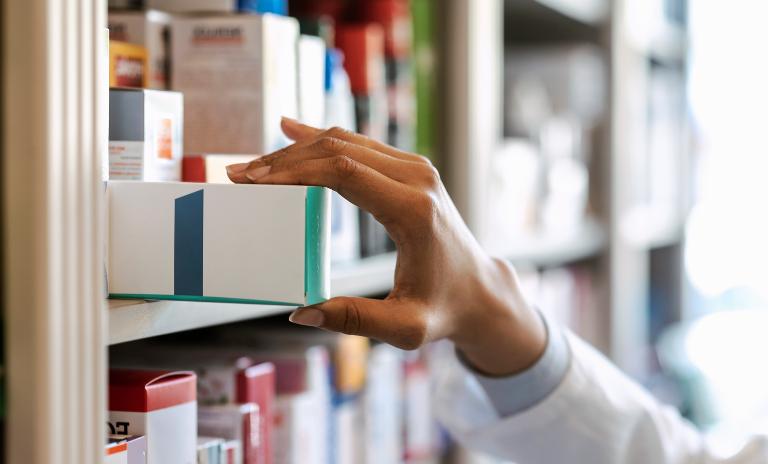" For a daily dose of antibiotic, a manufacturer receives between 6 and 16 cents today. To be able to cover the costs of producing in Germany, however, the price would have to be 46 cents. "



The global coronavirus pandemic has brought many production plants for drugs and the necessary precursors to a standstill in China. Various countries have also imposed export bans on certain products in order to secure supplies for their own populations. The vulnerability of our world's international division of labor is particularly evident in the case of medicines, especially antibiotics. But this is not a new development since the outbreak of the coronavirus. Morris Hosseini is a Partner in Roland Berger's Pharma & Healthcare Competence Center and has previously conducted numerous studies to analyze the dangers and problems arising from the global market's dependency on a small number of Asian drug manufacturers.

Many of the active ingredients for drugs and their precursors are produced almost exclusively in China today, and they're often concentrated in just a few plants. For example, over 80 percent of the precursors for antibiotics produced in Germany come from Asian countries, primarily China. If there are quality problems or production downtimes in one or more of the factories there, it directly affects supplies and indeed the entire supply chain all the way to Europe. That is true even without a coronavirus pandemic. The outbreak has, however, exacerbated the situation, as many of the plants producing these precursors are located in the province of Hubei, of all places, which is the hardest hit by the virus, so they are currently unable to produce anything. With the decline in the number of infected people in China hopefully continuing, these plants are now gradually being ramped up again. But they will presumably serve the local demand first and only then begin to export again. This means we may face bottlenecks for quite some time.
That is true, and even in the former Eastern Bloc medicines were not in short supply. There were production facilities in the GDR, for example, that were initially successful under the free market economy after the fall of the Berlin Wall. But since the 1980s, Western manufacturers had been using India as a low-cost location for the development and production of generics and had built up an efficient pharmaceutical industry there. Then the Chinese government decided to make targeted investments in drug production in order to avoid becoming dependent on other countries. And what could be more obvious for Chinese manufacturers than to use the factories' capacity to produce for export too? Fueled by cost-cutting measures in Western healthcare systems – namely the pressure on drug prices – generic drugs in particular became cheaper and cheaper, with the result that production in Germany became increasingly uneconomical and more and more production facilities had to be closed. Low environmental and safety requirements, cheap labor and state subsidies enabled Chinese manufacturers to offer active ingredients on the world market so cheaply that the prices of generic drugs in Germany and Europe fell under the sustained price pressure to such an extent as to create the situation we now find ourselves in. For a daily dose (DDD) of antibiotic, a manufacturer today receives 16 cents according to the list price. That's just 6 cents after deducting discounts. Simply to be able to cover the costs of producing in Germany, the price would have to be 46 cents for cephalosporins, for example, one of the most important groups of antibiotics. That is why all manufacturers in Germany and Europe gradually gave up the production of active ingredient precursors. They were forced out of the market by deliberate price dumping by China. Even the Indian pharmaceutical industry gets 80 percent of its precursors from China today.
"The coronavirus pandemic must be taken as a chance to set things in motion so that vital medicines and medically essential products are once again produced in Germany and in Europe."
The international division of labor and the world's interconnectedness hold many advantages, but they also make us vulnerable. It's not just events like the coronavirus pandemic that can cause deliveries to grind to a halt but, in the worst case scenario, a supply freeze can even be used for political blackmail. So we must ensure that we are at least minimally self-sufficient and produce a basic stock of essential goods here in Germany or at least in Europe. We do this for water, food, energy and so on – but not yet for essential medicines such as antibiotics.
That is correct, we are dealing with a failure of the market framework here. That is why the government must intervene and shape the framework in such a way that pharmaceutical manufacturers have an incentive to start producing here again. This could be done through subsidies – just as the EU supports agriculture so that it can cover its costs and ensure food supplies. Or it could be done by the state paying companies to provide production capacity – as it does on the electricity market. Both of these would be achievable at manageable cost. We have run the calculations for cephalosporins, which are the most important group of active ingredients for antibiotics besides penicillin – 80 percent of antibiotics are based on these two substances. In order to cover Germany's demand for cephalosporin locally, manufacturers would need to be subsidized to the tune of 55 million euros per year. Compared to the almost 400 billion euros that our healthcare system as a whole costs, this is certainly small change given the importance of antibiotics for healthcare.
Of course, we could simply say that the health insurance companies should pay higher prices and demand that the manufacturers switch to domestic production in return. But that is not really the health insurers' job. They have to budget with the money their policyholders pay them, and therefore keep costs down. So there is no alternative to the state setting the right framework itself.
Besides the production losses in China, there are other reasons behind the current supply problems for antibiotics and other medical goods: for example, export restrictions such as those imposed by India on antibiotic precursors or by Germany and the EU on protective clothing. Logistics are also currently complicated by the fact that borders are closed and supply chains interrupted. We can certainly turn these levers, for instance by coordinating distribution and border measures across the EU as quickly as possible. Last but not least, panic buying can also be a problem: If people start to stock up on medicines that are then missing when they're needed elsewhere, this will overload the supply chains. This is where doctors come in: they should give people advice and only issue prescriptions when there is a real need. But all of this helps only to a limited extent if the manufacturers are not producing sufficient supplies. So I'll say it once more: The coronavirus pandemic must be taken as a chance to tackle the issue once and for all, to set things in motion so that vital medicines and medically essential products are once again produced in Germany and in Europe.